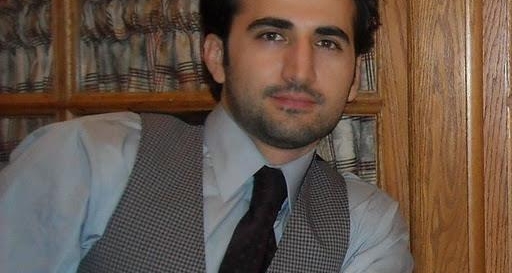Hekmati Family Hopes for His Release, Three Years after Arrest
Three years after his arrest in Tehran, US-born Amir Mirzaei Hekmati remains in prison. His family continues to hope that he will be released in time to see his father, who suffers from a terminal illness in the US. Hekmati’s earlier charges of espionage have been changed to “cooperating with a hostile government,” and his death sentence has been overturned, according to his lawyer, Seyed Mahmoud Alizadeh Tabatabaee.
His new sentence is 10 years in prison, which the family hopes will make his release possible, as Iranian law allows a prisoner who has displayed “acceptable behavior” to be released upon completion of one-third of his sentence, according to Sara Hekmati, Amir Hekmati’s sister, who spoke with the Campaign earlier this year.
Amir Mirzaei Hekmati, a United States citizen whose family is from Iran, traveled to Iran for the first time on August 14, 2011, to visit family. He obtained an Iranian passport and permission to enter the country for three months from the Iranian Interests Section in Washington, DC. After two weeks in Iran, Hekmati was arrested and imprisoned in Evin Prison in Tehran, with no explanation to his family.
In January 2012, Iran’s Revolutionary Court sentenced him to death on charges of “cooperating with an enemy state,” “membership in the CIA,” “moharebeh” (enmity with God), and “corruption on earth,” and aired a televised confession in which he claimed to be a CIA spy. His family has consistently held that he went to Iran to visit his grandmother and that he was forced to make false confessions. Televised forced confessions in politically motivated cases are a routine practice in Iran.
After an international outcry, Gholamhossein Mohseni Ejehi, the Iranian Judiciary Spokesperson, told reporters on March 5, 2012, that Hekmati’s death sentence had been overturned and the case had been sent to another branch for review. That same month the Supreme Court overturned Hekmati’s death sentence and ordered a retrial. He was sentenced to ten years in prison in April 2014, a sentence under appeal at this time.
Amir Hekmati spent 16 months in solitary confinement and is now inside Evin Prison’s General Ward. In a September 2013 letter addressed to US Secretary of State John Kerry, published in the Guardian, Amir Hekmati wrote, “For over two years I have been held on false charges based solely on confessions obtained by force, threats, miserable prison conditions, and prolonged periods of solitary confinement.”
On Memorial Day, May 26, 2014, the US Secretary of State John Kerry asked the Iranian government in a statement to release Amir Hekmati.







